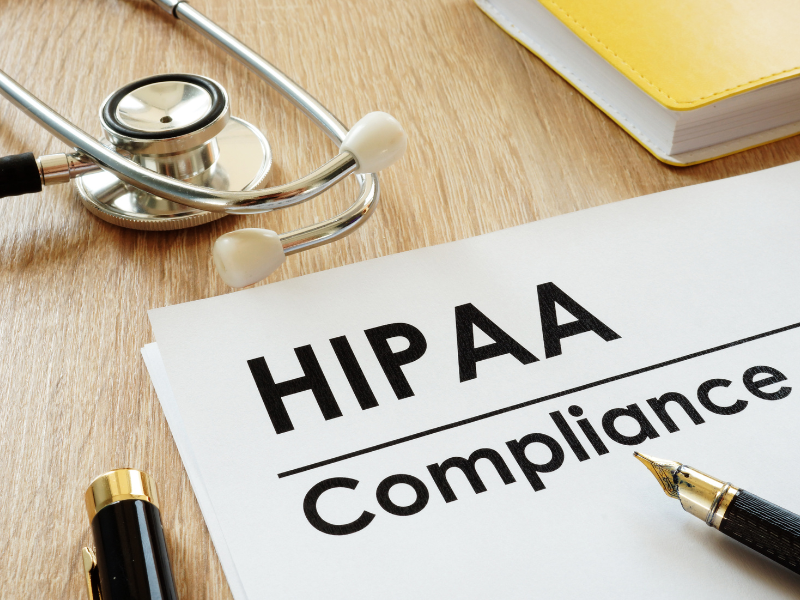Data security standards greatly aid the protection of sensitive information in the modern digital environment. Because of this, organizations across several sectors must adhere to two well-known standards: PCI DSS and HIPAA.
HIPAA (Health Insurance Portability and Accountability Act) and the PCI DSS (Payment Card Industry Data Security Standard) both focus on data protection, but they have different areas of emphasis.
When it comes to PCI DSS vs HIPAA, there are several key differences and similarities to consider.
Table of Contents

4 Key Similarities Between PCI DSS and HIPAA
The focus of PCI DSS and HIPAA is to protect sensitive data. They also share significant similarities:
- Both frameworks involve conducting risk analyses, implementing remediation processes, and regularly conducting vulnerability scans.
- Failure to comply with the requirements outlined by both standards can result in severe consequences, such as financial penalties, penalties in general, and an increased vulnerability to damaging data breaches.
- Specific system components handle both protected health information (PHI) and account data, further emphasizing the overlapping nature of these frameworks.
- Key infrastructure components, including antivirus software, log monitors, and active directories, are common to both HIPAA and PCI, highlighting their shared reliance on these technologies.
Notable Differences Between PCI DSS and HIPAA Compliance
PCI DSS and HIPAA are two critical frameworks in their respective industries. Albeit similar, they have different objectives and requirements.
These differences are as follows:
- HIPAA has a broader and more flexible structure compared to PCI DSS. It also provides fewer explicit details, allowing providers to independently determine and work out many implementation specifics.
- PCI DSS has well-defined and finite security requirements. It primarily focuses on safeguarding credit card transactions. In contrast, HIPAA covers a broader range of concerns, including patient safety, the right to privacy, quality improvement, and preventing fraud and abuse cases.
- Interestingly, health records hold significantly higher value in the black market compared to U.S. credit card numbers. Even basic health insurance information can fetch a price 10-20 times higher than a credit card number complete with a 3-digit CVV code.
- Compliance with HIPAA is mandatory for all covered entities, including their business associates. Any entity handling protected health information (PHI) must adhere to HIPAA regulations.
- Similarly, all businesses that process credit card transactions are required to comply with the standards set by PCI DSS. Doing so ensures the secure handling of credit card information and reduces the risk of data breaches.
- Additionally, the concept of meaningful use plays a significant role in HIPAA, particularly under the HITECH Act in the Omnibus Rule. Meaningful use helps address the most severe threats to electronic protected health information (ePHI), such as theft, loss, and phishing attacks. However, PCI DSS does not explicitly address the concept of meaningful use.

Applicability to Different Industries
The scope of PCI DSS and HIPAA is broad, but not every organization is obliged to adhere to both regulations. In fact, these regulations specifically target specific types of organizations.
PCI compliance becomes necessary for any organization involved in a transaction, encompassing tasks such as processing, storing, or transferring payment information. This requirement applies to eCommerce businesses, payment processing companies, cloud storage providers, and similar entities. Demonstrating PCI compliance allows major credit card companies and banks to view your organization as reliable and trustworthy.
On the other hand, HIPAA compliance pertains to specific categories of organizations listed as “covered entities” within the legislation. This primarily includes hospitals, clinics, health plans, nursing homes, pharmacies, and other relevant entities. These organizations are subject to HIPAA regulations to ensure PHI confidentiality.
Data Security Standards
There is a notable contrast between the language used to delineate the requirements of HIPAA and PCI security standards. HIPAA necessitates that covered entities establish administrative, physical, and technical safeguards to protect the confidentiality, integrity, and availability of the PHI that these entities generate, receive, transmit, and maintain.
In contrast, PCI standards delve into meticulous specifics regarding the safeguards organizations must implement to ensure compliance. For instance, the standards explicitly mandate installing and maintaining a firewall configuration to safeguard cardholder data. Additionally, they stress the significance of protecting all systems against malware and regularly updating antivirus software.

Achieving Compliance With PCI DSS and HIPAA
There are only a few points of overlap between the hundreds of validation points for HIPAA and PCI standards. While both standards aim to protect sensitive data, their methods of achieving compliance differ significantly. Complying with HIPAA does not automatically guarantee PCI compliance. Although some validation points are similar, the unique nature of each standard limits the extent of their compliance overlap.
To ensure HIPAA compliance, healthcare organizations should regularly conduct security risk analyses, provide employee training, and implement technical safeguards to prevent unauthorized access to protected health information. In the case of maintaining PCI compliance, it is crucial to foster cross-enterprise communication to account for all card data transmitted through an organization’s network.
Why Does Your Organization Need to Be PCI DSS and HIPAA Compliant?
PCI and HIPAA are two regulations of utmost significance, aiming to safeguard consumers against negligence and ill-intentioned entities. Whether you engage in the processing or handling of digital transactions or fall under the classification of a HIPAA-covered entity, it becomes imperative for you to adhere to the standards prescribed by these regulations.
Overall, there may be a big difference between PCI DSS and HIPAA. Meeting the requirements for compliance can also be challenging, but both are essential for safeguarding sensitive patient data from unwanted access.







